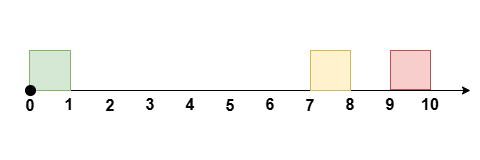3440. Reschedule Meetings for Maximum Free Time II #1910
-
Beta Was this translation helpful? Give feedback.
Replies: 1 comment 2 replies
-
|
We need to maximize the longest continuous period of free time during an event by rescheduling at most one meeting. The meetings are initially non-overlapping, and we can move one meeting to any available gap that can accommodate its duration without overlapping with other meetings. The goal is to find the maximum free time achievable after such a rescheduling. Approach
Let's implement this solution in PHP: 3440. Reschedule Meetings for Maximum Free Time II <?php
/**
* @param Integer $eventTime
* @param Integer[] $startTime
* @param Integer[] $endTime
* @return Integer
*/
function maxFreeTime($eventTime, $startTime, $endTime) {
$n = count($startTime);
$original_gaps = array();
$original_gaps[0] = $startTime[0];
for ($i = 0; $i < $n - 1; $i++) {
$original_gaps[$i + 1] = $startTime[$i + 1] - $endTime[$i];
}
$original_gaps[$n] = $eventTime - $endTime[$n - 1];
$total_gaps = $n + 1;
$prefix_max = array_fill(0, $total_gaps + 1, -1);
$prefix_second_max = array_fill(0, $total_gaps + 1, -1);
$prefix_max_count = array_fill(0, $total_gaps + 1, 0);
for ($i = 0; $i < $total_gaps; $i++) {
$cur = $original_gaps[$i];
$cur_max = $prefix_max[$i];
$cur_second = $prefix_second_max[$i];
if ($cur > $cur_max) {
$prefix_max[$i + 1] = $cur;
$prefix_second_max[$i + 1] = max($cur_second, $cur_max);
$prefix_max_count[$i + 1] = 1;
} else if ($cur == $cur_max) {
$prefix_max[$i + 1] = $cur_max;
$prefix_second_max[$i + 1] = $cur_second;
$prefix_max_count[$i + 1] = $prefix_max_count[$i] + 1;
} else {
$prefix_max[$i + 1] = $cur_max;
if ($cur > $cur_second) {
$prefix_second_max[$i + 1] = $cur;
} else {
$prefix_second_max[$i + 1] = $cur_second;
}
$prefix_max_count[$i + 1] = $prefix_max_count[$i];
}
}
$suffix_max = array_fill(0, $total_gaps + 2, -1);
$suffix_second_max = array_fill(0, $total_gaps + 2, -1);
$suffix_max_count = array_fill(0, $total_gaps + 2, 0);
$suffix_max[$total_gaps + 1] = -1;
$suffix_second_max[$total_gaps + 1] = -1;
$suffix_max_count[$total_gaps + 1] = 0;
for ($i = $total_gaps - 1; $i >= 0; $i--) {
$cur = $original_gaps[$i];
$cur_max = $suffix_max[$i + 1];
$cur_second = $suffix_second_max[$i + 1];
if ($cur > $cur_max) {
$suffix_max[$i] = $cur;
$suffix_second_max[$i] = max($cur_second, $cur_max);
$suffix_max_count[$i] = 1;
} else if ($cur == $cur_max) {
$suffix_max[$i] = $cur_max;
$suffix_second_max[$i] = $cur_second;
$suffix_max_count[$i] = $suffix_max_count[$i + 1] + 1;
} else {
$suffix_max[$i] = $cur_max;
if ($cur > $cur_second) {
$suffix_second_max[$i] = $cur;
} else {
$suffix_second_max[$i] = $cur_second;
}
$suffix_max_count[$i] = $suffix_max_count[$i + 1];
}
}
$ans = max($original_gaps);
for ($i = 0; $i < $n; $i++) {
$duration = $endTime[$i] - $startTime[$i];
if ($i == 0) {
$merged = $startTime[1];
} else if ($i == $n - 1) {
$merged = $eventTime - $endTime[$n - 2];
} else {
$merged = $startTime[$i + 1] - $endTime[$i - 1];
}
$maxA = ($i > 0) ? $prefix_max[$i] : -1;
$second_maxA = ($i > 0) ? $prefix_second_max[$i] : -1;
$count_maxA = ($i > 0) ? $prefix_max_count[$i] : 0;
$index_suffix = $i + 2;
if ($index_suffix <= $total_gaps) {
$maxC = $suffix_max[$index_suffix];
$second_maxC = $suffix_second_max[$index_suffix];
$count_maxC = $suffix_max_count[$index_suffix];
} else {
$maxC = -1;
$second_maxC = -1;
$count_maxC = 0;
}
$max_all = max($maxA, $merged, $maxC);
if ($max_all < $duration) {
continue;
}
$condition = false;
if ($maxA >= $duration && $maxA < $max_all) {
$condition = true;
}
if ($merged >= $duration && $merged < $max_all) {
$condition = true;
}
if ($maxC >= $duration && $maxC < $max_all) {
$condition = true;
}
if ($condition) {
$ans = max($ans, $max_all);
} else {
$count = 0;
if ($maxA == $max_all) {
$count += $count_maxA;
}
if ($merged == $max_all) {
$count += 1;
}
if ($maxC == $max_all) {
$count += $count_maxC;
}
if ($count >= 2) {
$ans = max($ans, $max_all);
} else {
$candidate_from_A = ($maxA < $max_all) ? $maxA : $second_maxA;
$candidate_from_merged = ($merged < $max_all) ? $merged : -1;
$candidate_from_C = ($maxC < $max_all) ? $maxC : $second_maxC;
$second_max_val = max($candidate_from_A, $candidate_from_merged, $candidate_from_C);
$candidate_i = max($second_max_val, $max_all - $duration);
$ans = max($ans, $candidate_i);
}
}
}
return $ans;
}
// Test cases
echo maxFreeTime(5, [1, 3], [2, 5]) . "\n"; // Output: 2
echo maxFreeTime(10, [0, 7, 9], [1, 8, 10]) . "\n"; // Output: 7
echo maxFreeTime(10, [0, 3, 7, 9], [1, 4, 8, 10]) . "\n"; // Output: 6
echo maxFreeTime(5, [0,1,2,3,4], [1,2,3,4,5]) . "\n"; // Output: 0
?>Explanation:
This approach efficiently checks all possible moves of a single meeting to maximize the free time, leveraging precomputed prefix and suffix arrays for optimal performance. |
Beta Was this translation helpful? Give feedback.



We need to maximize the longest continuous period of free time during an event by rescheduling at most one meeting. The meetings are initially non-overlapping, and we can move one meeting to any available gap that can accommodate its duration without overlapping with other meetings. The goal is to find the maximum free time achievable after such a rescheduling.
Approach